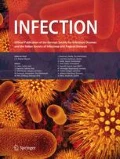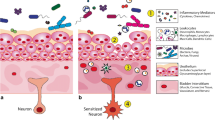Abstract
Purpose
We report on a kidney transplant recipient treated with fecal microbiota transplantation (FMT) for recurrent urinary tract infections.
Methods
FMT was administered via frozen capsulized microbiota. Before and after FMT, urinary, fecal and vaginal microbiota compositions were analyzed.
Results
The patient remained without symptoms after FMT.
Conclusions
Underlying mechanisms of action need to be addressed in depth by future research.

Similar content being viewed by others
References
Hooton TM. Recurrent urinary tract infection in women. Int J Antimicrob Agents. 2001;17:259–68.
Flores-Mireles AL, Walker JN, Caparon M, Hultgren SJ. Urinary tract infections: epidemiology, mechanisms of infection and treatment options. Nat Rev Microbiol. 2015;13:269–84. https://doi.org/10.1038/nrmicro3432.
Stapleton AE, Au-Yeung M, Hooton TM, Fredricks DN, Roberts PL, Czaja CA, et al. Randomized, placebo-controlled phase 2 trial of a Lactobacillus crispatus probiotic given intravaginally for prevention of recurrent urinary tract infection. Clin Infect Dis. 2011;52:1212–7. https://doi.org/10.1093/cid/cir183.
Sundén F, Håkansson L, Ljunggren E, Wullt B. Escherichia coli 83972 bacteriuria protects against recurrent lower urinary tract infections in patients with incomplete bladder emptying. J Urol. 2010;184:179–85. https://doi.org/10.1016/j.juro.2010.03.024.
Tariq R, Pardi DS, Tosh PK, Walker RC, Razonable RR, Khanna S. Fecal microbiota transplantation for recurrent clostridium difficile infection reduces recurrent urinary tract infection frequency. Clin Infect Dis. 2017;65:1745–7. https://doi.org/10.1093/cid/cix618.
Illumina. 16S Sample Preparation Guide. Illumina. 2016. http://www.illumina.com/content/dam/illumina-support/documents/documentation/chemistry_documentation/16s/16s-metagenomic-library-prep-guide-15044223-b.pdf. Accessed 27 Sept 2016.
Callahan BJ, McMurdie PJ, Rosen MJ, Han AW, Johnson AJA, Holmes SP. DADA2: High-resolution sample inference from Illumina amplicon data. Nat Methods. 2016;13:581. https://doi.org/10.1038/nmeth.3869. https://www.nature.com/articles/nmeth.3869#supplementary-information.
R Core Team. R: a language and environment for statistical computing. 3.2.5 ed. Vienna: R Foundation for Statistical Computing; 2016.
Tacke D, Wisplinghoff H, Kretzschmar A, Farowski F, Koehler P, Herweg J, et al. First implementation of frozen, capsulized faecal microbiota transplantation for recurrent Clostridium difficile infection into clinical practice in Europe. Clin Microbiol Infect. 2015;21:e82–4. https://doi.org/10.1016/j.cmi.2015.06.027.
Schreiber HL, Conover MS, Chou WC, Hibbing ME, Manson AL, Dodson KW, et al. Bacterial virulence phenotypes of Escherichia coli and host susceptibility determine risk for urinary tract infections. Sci Transl Med. 2017. https://doi.org/10.1126/scitranslmed.aaf1283.
Whiteside SA, Razvi H, Dave S, Reid G, Burton JP. The microbiome of the urinary tract—a role beyond infection. Nat Rev Urol. 2015;12:81–90. https://doi.org/10.1038/nrurol.2014.361.
den Heijer CD, Beerepoot MA, Prins JM, Geerlings SE, Stobberingh EE. Determinants of antimicrobial resistance in Escherichia coli strains isolated from faeces and urine of women with recurrent urinary tract infections. PLoS One. 2012;7:e49909. https://doi.org/10.1371/journal.pone.0049909.
Acknowledgements
We thank the patient for provision of clinical data and Anastasia Tsakmaklis and Fabiola Sack for excellent laboratory support.
Funding
This work was supported by the German Research Foundation (DFG) [BI 1899/1-1].
Author information
Authors and Affiliations
Corresponding author
Ethics declarations
Conflict of interest
LMB has received lecture honoraria from Astellas and Merck/MSD, and travel grants from 3M and Gilead. MJGTV reports grants and personal fees from Astellas Pharma, Merck/MSD, Gilead Sciences, Berlin Chemie, Falk Foundation, Organobalance, Pfizer, and grants from Astellas Pharma, Merck/MSD, Seres Therapeutics, DaVolterra. All other authors: none to declare.
Rights and permissions
About this article
Cite this article
Biehl, L.M., Cruz Aguilar, R., Farowski, F. et al. Fecal microbiota transplantation in a kidney transplant recipient with recurrent urinary tract infection. Infection 46, 871–874 (2018). https://doi.org/10.1007/s15010-018-1190-9
Received:
Accepted:
Published:
Issue Date:
DOI: https://doi.org/10.1007/s15010-018-1190-9




